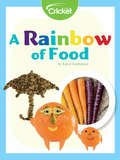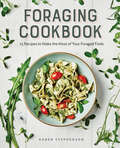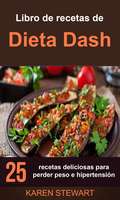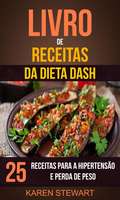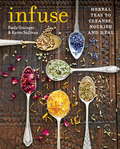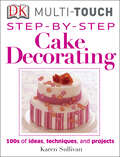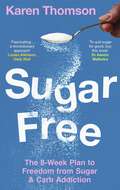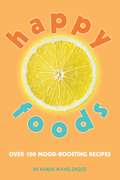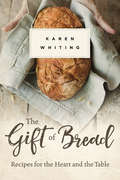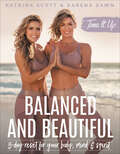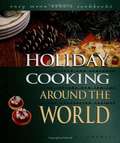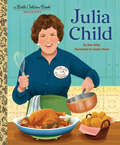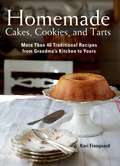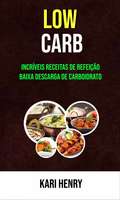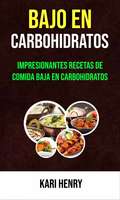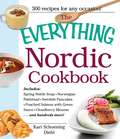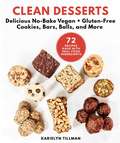- Table View
- List View
A Rainbow of Food
by Karen StephensonColors can help identify healthy substances in foods, such as vitamin A in oranges.
Foraging Cookbook: 75 Recipes to Make the Most of Your Foraged Finds
by Karen StephensonGreat meals sourced from the great outdoors—the practical approach to cooking foraged foods You don't have to go too far to find fresh flavors: an astounding array of delicious, nutritious, free ingredients is probably right outside your door. All you have to do is go find them—and cook them with care. The Foraging Cookbook makes it easy to go wild with wild foods, including berries, seeds, mushrooms, and more. From Baked Veggie Burgers to Wild Pizza, this comprehensive foraging cookbook delivers everything you need to transform fresh, found edibles into delectable dishes your whole family will enjoy. Get some fresh air and exercise while foraging local fields and nearby forests for your next mouthwatering meal—with a little help from The Foraging Cookbook. This complete foraging cookbook includes: 75 Tasty recipes—Discover dozens of dishes, including plenty of main courses and substantial meals, arranged by the type of foraged food, including greens, mushrooms, seeds, and fruit. The basics—Learn the fundamentals of foraging, facts on ethical harvesting, and how to grow or buy "foraged" foods. Easy-to-find, easy-to-forage—All ingredients are widely available, easily foraged foods that grow near human habitation. Finding your next forage-to-table feast has never been so fun and easy than with The Foraging Cookbook.
Libro de recetas de Dieta Dash: 25 recetas deliciosas para perder peso e hipertensión
by Karen StewartEn estos últimos años, la obesidad, la diabetes y la presión arterial alta se han vuelto problemas que afectan a millones de personas todos los días y que pueden amenazar sus vidas. Tomar decisiones saludables puede parecer un proceso dificultoso, pero ahora puedes lograr un cuerpo, una menta y espíritu más sanos siguiendo los pasos que indica este libro. Si bien, a fin de cuentas, eres tú quien decide y maneja su salud, este libro puede ser utilizado como un punto de partida para buscar ideas e inspiración para mejorar tu salud de manera rápida y efectiva. En este libro encontrarás un guía fácil y rápida para seguir la dieta DASH. Además, conseguirás 25 deliciosas recetas apropiadas por DASH que no solo ayudarán a mejorar tu nivel de presión arterial, sino que también te ayudará a perder peso de una manera saludable. Encontrarás recetas para el desayuno, para los platos principales (ya sea almuerzo o cena), para usar como acompañantes que pueden server de aperitivo, y para postres. La dieta DASH tiene en cuenta el modo de vida moderna y te permite decidir libremente hasta cierto punto, en vez de simplemente restringirte cosas. Puedes comer cosas saludables, y la palabra “saludable” no necesita ser asociada con la palabra “aburrido”. Tienes muchas opciones para maravillosas comidas en esta dieta para que así puedas tomar el control nuevamente de tu vida, hacienda que ésta sea tan larga y saludable como sea posible. Tú tienes en tus manos cuán larga quieres que sea tu vida. Cuídala y utiliza la dieta DASH para ayudarte a hacerlo. ¡Si quieres comenzar y hacer un cambio permanente para tu estilo de comidas, este libro es indispensable!
Livro de Receitas da dieta DASH: 25 Receitas para a Hipertensão e Perda de Peso
by Karen Stewart Marta SenaReceitas lendárias da dieta DASH para perder peso! Livro de Receitas da Dieta DASH Nos últimos anos, a obesidade, a diabetes e a pressão arterial alta têm sido problemas proeminentes e potencialmente fatais que milhões de pessoas enfrentam todos os dias. O caminho para ser saudável pode parecer difícil, mas pode ter um corpo, mente e espírito mais saudável com os passos presentes neste livro. Enquanto que, em última instância, é o leitor quem determina e gere a sua saúde, este livro pode ser usado como um pedra basilar para encontrar ideias e inspiração para melhorar a sua saúde de forma rápida e eficaz. Neste livro, irá encontrar um guia rápido e fácil para seguir a dieta DASH. Ganhará 25 receitas deliciosas que o ajudarão não só a melhorar os seus níveis de pressão arterial, mas também a perder peso de uma forma saudável. Irá encontrar receitas para o pequeno-almoço, pratos principais – seja para o lanche ou jantar – e acompanhamentos que também podem servir para petiscar ou para sobremesas. A dieta DASH tem em consideração a forma de vida moderna e permite-lhe liberdade de escolha, em vez de lhe impor restrições. Pode comer comidas saudáveis sem que a palavra “saudável” esteja associada a “aborrecidas”. Tem muitas escolhas de refeições deliciosas com esta dieta e pode, finamente, recuperar o controlo da sua vida, tornando-a tão longa e saudável como possível. A sua longevidade está nas suas mãos. Estime-a e use a dieta DASH para o ajudar. Se quiser fazer uma mudança permanente nos seus hábitos alimentares, este é o livro que tem de ler! Adquira-o já!
World of Pies: A Novel
by Karen StolzRoxanne is twelve years old and wild for baseball in 1962, the year of a pie-baking contest that will change her life forever. Life in the small town of Annette, Texas, has been idyllic, cozy; until this summer, Roxanne's toughest choices have revolved around whether to wear an apron while she helps her mother in the kitchen or whether to pitch underhand or over. The summer of 1962 brings Roxanne her first glimpse of a life that isn't always fair or even very nice, and though she always ends up returning to the warmth and pleasures of small-town life, Roxanne will be pushed into growing up a little faster after this summer. In this remarkable debut work from author Karen Stolz--a novel in stories--we follow the arc of a girl's life as she grows to womanhood. From crushes to surprise baby sisters to nail polish to a devastating death, Roxanne is our guide through a life that has moments of tenderness, poignancy, sorrow, and great humor, as well as some pretty great baking moments (recipes included). The recipes are for Roxanne's hot-out-of-the-oven comfort foods: Aunt Ruthie's Cinnamon Rolls, Mabel's Angel Food Cake with Chocolate Sauce, and, of course, Miss Cherry Pie. A sumptuous, sweet novel--though, like the best pie, tart in all the right places.
Infuse: Herbal teas to cleanse, nourish and heal
by Paula Grainger Karen SullivanLost your zest for life? Feeling tired and sluggish? Need a health boost?Reach for a soothing cup of herbal tea and harness the extraordinary power of nature's most potent healing ingredients. With more than 70 expertly formulated recipes for tasty, soothing, caffeine-free infusions, tea tips to help you get the most from your brew, and a comprehensive directory of herbal ingredients and their active properties and benefits, you can blend, brew and sip your way to wellbeing.
Infuse: Herbal teas to cleanse, nourish and heal
by Paula Grainger Karen SullivanLost your zest for life? Feeling tired and sluggish? Need a health boost?Reach for a soothing cup of herbal tea and harness the extraordinary power of nature's most potent healing ingredients. With more than 70 expertly formulated recipes for tasty, soothing, caffeine-free infusions, tea tips to help you get the most from your brew, and a comprehensive directory of herbal ingredients and their active properties and benefits, you can blend, brew and sip your way to wellbeing.
Step-by-Step Cake Decorating: Hundreds of Ideas, Techniques, and Projects for Creative Cake Designers
by Karen SullivanFrom delicate creations for weddings to fantastical birthday cupcakes, Step-by-Step Cake Decorating contains 20 remarkable projects for every occasion. There are more than 100 pages of step-by-step icing, piping, stenciling, painting, and cutting techniques. Each cake recipe includes fun, unique tips and variations for turning it into cupcakes and cake pops. Home bakers looking to impress their friends and family with gorgeous confections will love these smart, elegant projects.
Sugar Free: 8 Weeks to Freedom from Sugar and Carb Addiction
by Karen ThomsonAre you a sugar addict? Do you crave sweet treats, bread, pasta and sauce-laden food? Do you experience lethargy and mood swings as a result of blood glucose spikes and dips? Does your weight seesaw unmanageably?If the answer is yes to any of these questions, your health is at risk. Where fat used to be the enemy, scientists now point to the huge amount of sugar we consume as making us unhealthy. Sugar Free is packed with recent scientific research and nutritional advice to help you understand addiction to sugar and carbohydrates, including a chapter by Dr Nicole Avena, research neuroscientist, author and expert in nutrition, diet and addiction. It provides eight weeks of meal plans, both vegetarian and non-vegetarian, by nutritionist Emily Macguire, and includes journal exercises to help you break free from the mental, physical and emotional traps of old eating patterns. Sugar Free shows the way to a sustainable sugar-free lifestyle. Its simple and effective eight-week programme to quit sugar will enable you and your family to enjoy dramatically improved health, increased energy levels and weight loss. Author Karen Thomson is living in recovery from addiction to sugar and carbohydrates so has been there and understands exactly what you need to know to break the cycle of addiction and find your way to radically improved health.
Sugar Free: 8 Weeks to Freedom from Sugar and Carb Addiction
by Karen ThomsonA simple and effective 8-week programme to quit sugar for good, improve your health and achieve sustainable weight loss.Are you a sugar addict? Do you crave sweet treats, bread, pasta and sauce-laden food? Do you experience lethargy and mood swings as a result of blood glucose spikes and dips? Does your weight fluctuate uncontrollably? If the answer to any of these questions is yes, your health is at risk. While fat was once seen as the enemy, scientists now point to the enormous amount of sugar we consume as a significant factor in declining health.Sugar Free will help you beat your sugar habit and improve your mood, energy levels and health. It contains:- the latest scientific research and nutritional advice, including a chapter by Dr Nicole Avena, research neuroscientist and pioneer in the field of food addiction- 8 weeks of meal plans by nutritionist Emily Macguire, both vegetarian and non-vegetarian- journal exercises to help you break free from the mental, physical and emotional traps of unhealthy eating patterns.Author Karen Thomson is living in recovery from addiction to sugar and carbohydrates, so she understands exactly what you need to know to break the cycle of addiction and enjoy radically improved health. Read Sugar Free and find the way to a sustainable sugar-free lifestyle.
Sugar Free: 8 Weeks to Freedom from Sugar and Carb Addiction
by Karen ThomsonA simple and effective 8-week programme to quit sugar for good, improve your health and achieve sustainable weight loss.Are you a sugar addict? Do you crave sweet treats, bread, pasta and sauce-laden food? Do you experience lethargy and mood swings as a result of blood glucose spikes and dips? Does your weight fluctuate uncontrollably? If the answer to any of these questions is yes, your health is at risk. While fat was once seen as the enemy, scientists now point to the enormous amount of sugar we consume as a significant factor in declining health.Sugar Free will help you beat your sugar habit and improve your mood, energy levels and health. It contains:- the latest scientific research and nutritional advice, including a chapter by Dr Nicole Avena, research neuroscientist and pioneer in the field of food addiction- 8 weeks of meal plans by nutritionist Emily Macguire, both vegetarian and non-vegetarian- journal exercises to help you break free from the mental, physical and emotional traps of unhealthy eating patterns.Author Karen Thomson is living in recovery from addiction to sugar and carbohydrates, so she understands exactly what you need to know to break the cycle of addiction and enjoy radically improved health. Read Sugar Free and find the way to a sustainable sugar-free lifestyle.
Happy Foods
by Karen Wang DiggsDo you want to feel better about what you eat? Do you want to feel better all day long? Truly healthy food is not only better tasting, it is far less expensive and can change your mental outlook on life. Author Karen Wang Diggs has lived in Hong Kong, mainland China and the United States and brings a wealth of this food knowledge, village wisdom and secrets to healthy living from her travels as well as the hard science of nutrition. As a chef, nutritionist and cooking instructor, Diggs has helped hundreds overcome eating issues and arrive at a food lifestyle that has them smiling again. From dealing with diabetes to smart and safe approaches to weight-loss and even working with cancer patients to find foods that give them a new lease on life, Diggs' savvy, know-how and food smarts are all packed into the clean cuisine of Happy Foods.
Happy Foods: Over 100 Mood-Boosting Recipes
by Karen Wang DiggsDo you want to feel better about what you eat? Do you want to feel better all day long? Truly healthy food is not only better tasting, it is far less expensive and can change your mental outlook on life. Author Karen Wang Diggs has lived in Hong Kong, mainland China and the United States and brings a wealth of this food knowledge, village wisdom and secrets to healthy living from her travels as well as the hard science of nutrition. As a chef, nutritionist and cooking instructor, Diggs has helped hundreds overcome eating issues and arrive at a food lifestyle that has them smiling again. From dealing with diabetes to smart and safe approaches to weight-loss and even working with cancer patients to find foods that give them a new lease on life, Diggs' savvy, know-how and food smarts are all packed into the clean cuisine of Happy Foods.
Pickles, Peaches and Chocolate
by Karen WardWelcome to my kitchen. Come with me as I share some of my favorite recipes and ideas for giving gifts of food. Let me illustrate how easy it can be to make those favorite recipes for friends and family. Determine the amount of time you have. Select your recipom the chapters, "No Cooking", "Some Cooking", and "Lot'sa Cooking". Then it's ready, set, gift! The recipes are perfect for year-round giving and contain a "gift presentation" idea for each recipe! Whether you're an experienced cook or new to the kitchen, this book is for you. Once these recipes become your favorites, you may find yourself always taking a gift of food wherever you go.
The Gift of Bread: Recipes for the Heart and Table
by Karen WhitingThirty-one chapters, each featuring detailed and easy to follow recipes for breads of every kind, celebrate the many ways we come together around the table. Whether you are a baker who enjoys thoughtful, inspirational writing or a reader who loves a good cookbook, you will find heartfelt stories and inspirations throughout this book. Expert tips, how-tos, and pointers will turn even a novice into a successful baker, and the writing will encourage readers to reach out and share their bounty with others, while thanking God for their daily bread.
Receitas rápidas, simples e deliciosas de sucos para emagrecimento
by Karen ZiesmerUma dieta nutritiva e saudável é essencial para qualquer um, principalmente para aqueles que lutam contra doenças crônicas relacionadas ao metabolismo, como a diabetes. Mesmo alguns alimentos considerados saudáveis podem ser contra indicados para diabéticos. Você quer viver sem temer uma morte por doença? Você quer voltar a caber naquele jeans? Quer voltar a ter saúde para exercitar-se? Terá tudo isso depois de ler este livro, pois, seguindo as receitas dele poderá inspirar-se e criar seus próprios. Perca peso, crie músculos, fique sarado. Quer mudar, mas, não sabe por onde começar? Um bom começo para quem não sabe o que fazer é mudar sua alimentação, você pode começar pelas receitas aqui presentes.
Tone It Up: 5-Day Reset for Your Body, Mind, and Spirit
by Karena Dawn Katrina ScottHey, Gorgeous! Welcome to Tone It Up, a worldwide community of amazing girlfriends who support and encourage each other to live our happiest, healthiest, and most confident lives. We’re so happy you’re here! Balanced and Beautiful is a 5-day plan to Refresh, Motivate, Inspire, Energize, and Relax so you can focus on you—you deserve it! Each day, you’ll find tips and advice for every aspect of your journey, including:Amazing workouts—beach yoga, ab and booty sculpting, and energizing cardioDelicious recipes that you’re going to love! Pancakes, Strawberry-Avo Toast, Blueberry Chia Muffins, and easy dinners for hostingGuides to fun workouts, girlfriend get- togethers, DIY face masks, essential oils, meditation, and advice for living your best lifeThroughout these pages, you’ll feel empowered, uplifted, and connected, with the entire Tone It Up community beside you cheering you on.Ready to reset and refresh? Feeling balanced and beautiful is only 5 days away!
Holiday Cooking Around the World: Revised and Expanded to Include New Low-fat and Vegetarian Recipes
by Kari A. CornellCompletely revised and updated, the Easy Menu Ethnic Cookbooks series serves up tantalizing recipes for countless dishes. Seasoned with vibrant, color photographs and easy, step-by-step directions, many of the recipes are low in fat and call for ingredients you may already have at home. Also included are new vegetarian recipes, complete menu suggestions, and an expanded cultural section highlighting each country or region's people, customs, holidays--and of course, food.
Julia Child: A Little Golden Book Biography (Little Golden Book)
by Kari AllenDream big with a Little Golden Book biography about Julia Child, the chef and cookbook author who introduced Americans to the art of French cooking. It's the perfect introduction to nonfiction for young readers—as well as fans of all ages!This Little Golden Book about Julia Child—beloved for her entertaining and informative cooking shows—is an inspiring read-aloud for all young sous chefs. Bon appétit!Look for more Little Golden Book biographies: • Harry Belafonte • Martha Stewart • Iris Apfel • Oprah Winfrey • Jacques Pépin
Homemade Cakes, Cookies, and Tarts: More Than 40 Traditional Recipes from Grandma?s Kitchen to Yours
by Kari FinngaardThe fresh scent of just-out-of-the-oven cookies or a warm and toasty apple pie is hard to ignore. And more often than not, these scrumptious smells are reminiscent of our fondest childhood memories--playing games with siblings at grandma’s house, or curling up by the fireplace and listening to grandma tell tales of her own childhood. As we mature, grow older, and start our own families, we often lose sight of these precious memories until something or someone reminds us of them. Homemade Cakes is a trip down memory lane that takes you back to your childhood kitchen and reminds you of the precious moments you had growing up. Recipes include beloved classics such as: * Decadent Chocolate Cake * Blueberry Pancakes * Fresh Banana Bread Home baking is an excellent way to foster relationships with your family and spend time with loved ones. These memories are sure to last a lifetime. Homemade Cakes is a sure way to build new memories and reminisce about old ones.
Low Carb: Incríveis Receitas De Refeição Baixa Descarga De Carboidrato
by Kari HenryEu sei que você esteve olhando para aquele pneuzinho extra. Você esteve olhando para aquela gordurinha na região toráxica, e você provavelmente esteve pensando que seus pneuzinhos são permanentes. Na verdade não. Ao simplesmente mudar o seu jeito de comer, você pode finalmente dizer adeus a todos aqueles quilinhos irritantes. Eu sei que parece difícil de acreditar a essa altura do campeonato, mas deixe me te dizer que este plano de alimentação que eu vou te ensinar vai de contra tudo aquilo que você já ouviu ou sabe sobre perda de peso. É realmente isso. De fato, se você continuar com esse plano, quanto mais gordura você comer, mais gordura (e eu estou falando do seu peso) você perderá. Leve uma copia hoje clicando no topo desta página!
Bajo En Carbohidratos: Impresionantes Recetas de Comida Baja en Carbohidratos
by Kari Henry - Golden Urban Books PublishingSé que estás mirando esa panza extra. Está mirando esa flacidez en tu sección media, y probablemente esté pensando que esa panza es permanente. No es así. Simplemente cambiando la forma en que comes podras decir adiós a todos esos molestos kilos de más. Sé que parece difícil de creer en este momento, pero déjame decirte que este plan de alimentación que te voy a enseñar cambia todo lo que has escuchado o sabes sobre la pérdida de peso. Realmente lo hace. De hecho, si te apegas a este plan, cuanto más grasa comas, más grasa (y estoy hablando de tu peso) perderá.
The Everything Nordic Cookbook
by Kari Schoening DiehlThe new Nordic cuisine--simple, healthy, and fresh Do you want to cook rich and flavorful Scandinavian fare, such as Lobster Salad with Nobis Dressing or Danish Coconut Dream Cake, but don't know where to start? With this collection of recipes, you can craft unique dishes inspired by the natural world anytime. From simple breakfasts to elaborate smorgasbords, this comprehensive cookbook introduces you to the delightful tastes and healthful benefits of the Nordic lifestyle with more than 300 easy-to-make recipes, including: Gingersnap Meatballs Savory Pear Soup Norwegian Eggs Benedict Spring Chicken Salad with New Asparagus and Pickled Rhubarb Smoked Trout with Summer Vegetables Swedish Apple Cake Whether you're looking to simplify your diet, want to try home preserving, or can't get enough of Scandinavian products like smoked salmon and lingonberry jam, The Everything Nordic Cookbook has all the tips and recipes you need to reap the rewards of the Nordic lifestyle!
The Everything Nordic Cookbook: Spring Nettle Soup, Norwegian Flatbread, Swedish Pancakes, Poached Salmon with Green Sauce, Cloudberry Mousse...and hundreds more!
by Kari Schoening DiehlThe new Nordic cuisine--simple, healthy, and freshDo you want to cook rich and flavorful Scandinavian fare, such as Lobster Salad with Nobis Dressing or Danish Coconut Dream Cake, but don't know where to start? With this collection of recipes, you can craft unique dishes inspired by the natural world anytime. From simple breakfasts to elaborate smorgasbords, this comprehensive cookbook introduces you to the delightful tastes and healthful benefits of the Nordic lifestyle with more than 300 easy-to-make recipes, including:Gingersnap MeatballsSavory Pear SoupNorwegian Eggs BenedictSpring Chicken Salad with New Asparagus and Pickled RhubarbSmoked Trout with Summer VegetablesSwedish Apple Cake Whether you're looking to simplify your diet, want to try home preserving, or can't get enough of Scandinavian products like smoked salmon and lingonberry jam, The Everything Nordic Cookbook has all the tips and recipes you need to reap the rewards of the Nordic lifestyle!
Clean Desserts: Delicious No-Bake Vegan & Gluten-Free Cookies, Bars, Balls, and More
by Karielyn TillmanIndulge in 72 vegan, gluten-free, no-refined-sugar recipes made with nutrient-dense ingredients! Clean, wholesome, delicious desserts—they're easier to make that you might think. Tired of desserts made with highly processed ingredients and empty calories that leave you feeling guilty? Then say goodbye to boxed cake mixes, Jell-O, and Cool-Whip, and satisfy your sweet cravings with 72 no-bake desserts you’ll feel good about eating. Featuring vegan, gluten-free, and no-refined sugar recipes (that are simple and easy to make), Clean Desserts uses real food ingredients like nuts, seeds, nut butters, and dates to whip up guilt-free cookies, bars, balls, and classic candy bars, as well as no-bake cheesecakes, tarts, and ice cream! Learn to make: Black Forest Thumbprint CookiesChocolate Chia Seed BarsHazelnut Caramel BallsRaspberry MacaroonsKiwi + Coconut Cheesecake SquaresPecan Praline Ice CreamDark Chocolate Pistachio FudgeAnd more! Complete with photographs, Clean Desserts will change the way you feel about dessert!
